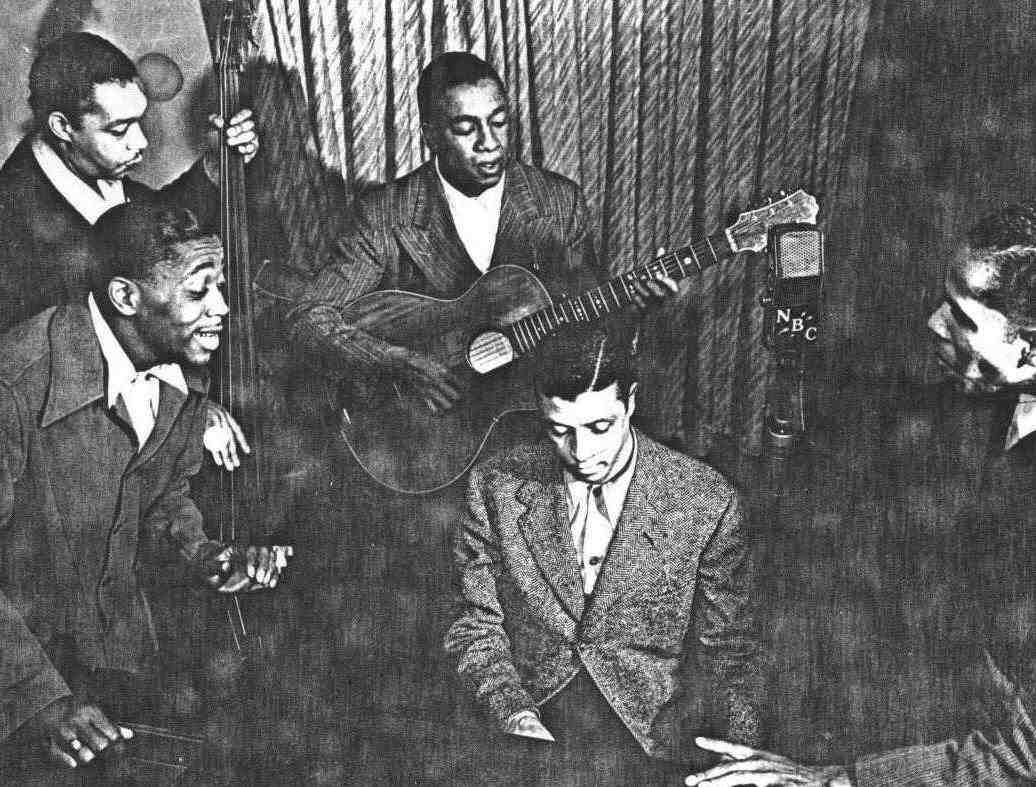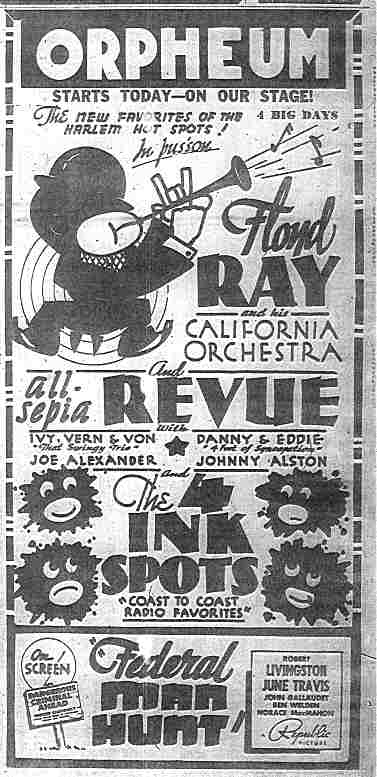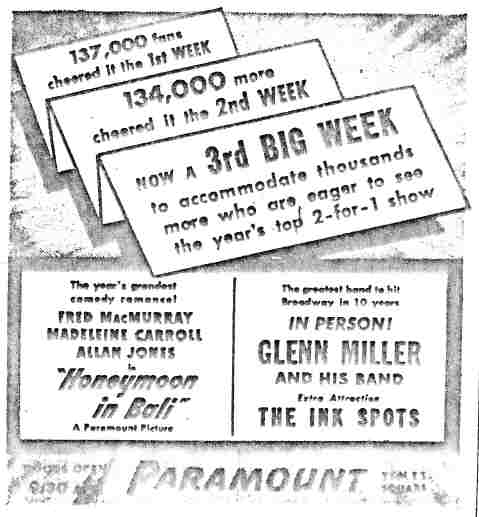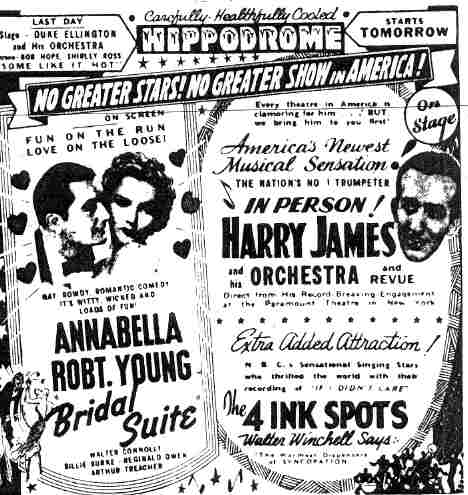| MEMBERS:
Bill Kenny (tenor voice), Orville "Hoppy" Jones (bass voice, cello strung as bass or bass), Ivory "Deek" Watson (2nd tenor voice, guitar ), Charlie Fuqua (baritone voice, guitar, ukelele), Robert "Bob" Benson (pianist, arranger) |
||
|
We believe this photo includes Bob Benson (based on the process
of elimination, the pianist does not seem |
||
| This is the group that became famous
following the release of their recording If I Didn't Care.
In the same way that A Tisket A Tasket propelled Ella Fitzgerald
to instant fame, this song worked wonders for the Ink Spots.
The decision to hire Robert "Bob" Benson in November of 1938 was another ingredient of their new style. The piano was not needed for the old 'hotcha' swing/jump tunes but it made an important contribution to their new ballad-style songs. The difference can be appreciated by comparing pre-1939 songs such as their Decca recording, I Wish You the Best of Everything , or, So Little Time and So Much ToDo (Aug/38 NBC radio broadcast) to this group's recorded ballads. While the previous group had featured all parts of the style that made them famous, except for piano accompaniment, they needed a song that would catch fire with the record-buying public. This meant appealing to white audiences as well as black. Given the many barriers to crossing the color line in the late '30s, this single song put both their recording and vaudeville careers on the path to success. |
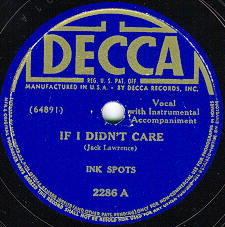
This January 1939 recording made them famous with both black and white audiences. Listen to If I Didn't Care on YouTube.
The week after they recorded If I Didn't Care, they were appearing in Memphis, TN at the Orpheum Theater. |
|
|
By September of 1939 the Ink Spots made their first appearance at the Paramount in New York. |
||
| Recordings:
Decca - New York |
||
| 12Jan/39 | If I didn't Care
Just For A Thrill Knock Kneed Sal (On the Mourner's Bench) |
Released Feb/39 - #2286A
Released about Jun/39 - #2507B Released Feb/39 - #2286B |
| 17May/39 | It's Funny To Everyone But Me | Released about Jun/39 - #2507A |
| 17Aug/39 | You Bring Me Down
I Don't Want Sympathy, I Want Love Address Unknown Coquette |
Released about Oct/39 - #2707B
Released about Dec/39 - #2841B Released about Oct/39 - #2707A Released Apr/40 - #3077B |
| 19Sep/39 | My Prayer
Give Her My Love |
Released about Nov/39 - #2790A
Released about Nov/39 - #2790B |
| 3Oct/39 | Memories Of You | Released Jan/40 - #2966A |
| 6Oct/39 | Thoughtless
I'm Through What Can I Do? |
Released Sep/45 - #18711B
Released Jan/40 - #2966B Released Jun/40 - #3195B |
| 11Oct/393077 | I'm Getting Sentimental Over You
Bless You (for Being An Angel) |
Released Apr/40 - #3077A
Released about Dec/39 - #2841A |
| 13May/40 | When the Swallows Come Back To Capistrano
Note: A note in the Afro-American [Baltimore, 8Jun/40] states that Bob Benson has been replaced by Ace Harris although no date for the change is given. It seems likely that Benson made his last recording with the Ink Spots on 13 May/40. |
Released Jun/40 - #3195A |
| Radio: Although they were still advertised as NBC radio stars, this group's radio time was much reduced - possibly because their recording and vaudeville careers took center stage following the release of If I Didn't Care. Only the months of July-Sep/39 included frequent NBC national network broadcasts. Other one-time radio shows included Hobby Lobby, NBC Curtain Calls of 1939 and a Dec/39 ABC show that also featured Bob Crosby & His Orch., Jimmy Mercer and Helen Ward. | ||
|
Vaudeville: This is the group that made it "big time" in vaudeville. While the Ink Spots had appeared at many theaters in the U.S. and Britain before 1939, they crossed over to white theaters as headliners after the release of If I Didn't Care. The crossover was slowed somewhat because, before their popularity soared, their manager Moe Gale, had booked them into the Little Rathskeller in Philadelphia beginning the end of May/39 for 14 weeks . In spite of efforts to negotiate a release from the contract, only one change was achieved - a one week appearance at the white Hippodrome in Baltimore beginning 30 June with Harry James and his orchestra including Frank Sinatra.
They were billed as an "extra added attraction" because they were black. Coming at the last of the show, Variety states:
To make this change, the Little Rathskeller was promised
a make-up of the week at a later date and an unknown financial consideration
was paid [Variety, 5July/39].
Beginning 20 September, the Ink Spots made their first appearance at the Paramount in NYC with Glenn Miller and his orchestra. They again had to be billed as an "extra attraction" but indications are that they stole the spotlight from Miller. A Variety reviewer stated, "Real clicks of the current show are the 4 Ink Spots..." and Billboard said, "Miller made a mistake at the last show opening day, playing on top of an enormous hand the house gave the quartet. They really whammed and Miller should have brought them back, regardless of running time. [Variety, 27Sep/39 and Billboard, 30Sep/39] Black newspapers went further, "...were so talented that even Miller had to give way for them show after show." [Pittsburgh Courier, 14Oct/39] Following their appearance at the Paramount, the Ink Spots went on to appear at the top Vaudeville houses in the country.
|
||
| Last revised, 27Jul/03 | ||
